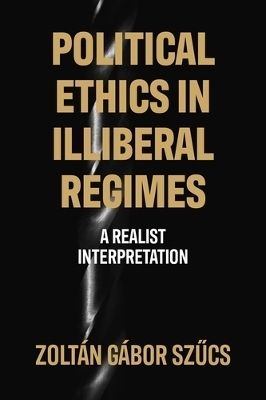
Political Ethics in Illiberal Regimes
A Realist Interpretation
Seiten
2023
Manchester University Press (Verlag)
978-1-5261-4234-4 (ISBN)
Manchester University Press (Verlag)
978-1-5261-4234-4 (ISBN)
This book explores how and why citizens come to terms with living in illiberal regimes and offers a new, liberal realist approach to political ethics. -- .
What is it like to live in an illiberal regime? Ethical life in totalitarian regimes is easy to critique because it deviates from everything we think morally acceptable. But illiberal regimes are similar enough to liberal democracies to make addressing the experience of living there strikingly difficult.
Political ethics in illiberal regimes argues that the common language of normative political theory is simply not up to the task of capturing this experience. On the one hand, we do not really need political theory to know why illiberal regimes are dangerous and undesirable. On the other, we do need political theory – at least of a certain realist kind – to understand why millions of reasonable people come to terms with living in such regimes.
The book presents a novel theoretical language – Williamsian, liberal and realist – to articulate this experience. Part I lays out the theoretical framework, while Part II examines how politicians, experts and citizens in illiberal regimes are confronted with role-specific, political-ethical challenges and how the various normative contexts of their roles shape their agency. -- .
What is it like to live in an illiberal regime? Ethical life in totalitarian regimes is easy to critique because it deviates from everything we think morally acceptable. But illiberal regimes are similar enough to liberal democracies to make addressing the experience of living there strikingly difficult.
Political ethics in illiberal regimes argues that the common language of normative political theory is simply not up to the task of capturing this experience. On the one hand, we do not really need political theory to know why illiberal regimes are dangerous and undesirable. On the other, we do need political theory – at least of a certain realist kind – to understand why millions of reasonable people come to terms with living in such regimes.
The book presents a novel theoretical language – Williamsian, liberal and realist – to articulate this experience. Part I lays out the theoretical framework, while Part II examines how politicians, experts and citizens in illiberal regimes are confronted with role-specific, political-ethical challenges and how the various normative contexts of their roles shape their agency. -- .
Zoltán Gábor Szucs is an Associate Professor at Eötvös Loránd University, Faculty of Social Sciences, Budapest and a Research Fellow at Centre for Social Sciences, Budapest -- .
Acknowledgments
Introduction
Part I: In theory
1 The case for a liberal political realism
2 A neo-Aristotelian regime theory to the rescue
3 The political-ethical experience of living in illiberal regimes
Part II: In practice
4 The politics of illiberal ambition
5 Independence in an illiberal regime
6 Illiberal citizenship
Conclusion
References
Index -- .
| Erscheinungsdatum | 28.03.2023 |
|---|---|
| Verlagsort | Manchester |
| Sprache | englisch |
| Maße | 156 x 234 mm |
| Gewicht | 463 g |
| Themenwelt | Geisteswissenschaften ► Philosophie |
| Sozialwissenschaften ► Politik / Verwaltung ► Europäische / Internationale Politik | |
| Sozialwissenschaften ► Politik / Verwaltung ► Vergleichende Politikwissenschaften | |
| ISBN-10 | 1-5261-4234-1 / 1526142341 |
| ISBN-13 | 978-1-5261-4234-4 / 9781526142344 |
| Zustand | Neuware |
| Haben Sie eine Frage zum Produkt? |
Mehr entdecken
aus dem Bereich
aus dem Bereich
Studienbuch
Buch | Hardcover (2023)
De Gruyter Oldenbourg (Verlag)
44,95 €
erfolgreiche Interessenvertretung durch Prozesskompetenz im komplexen …
Buch | Hardcover (2023)
Wiley-VCH (Verlag)
42,00 €


